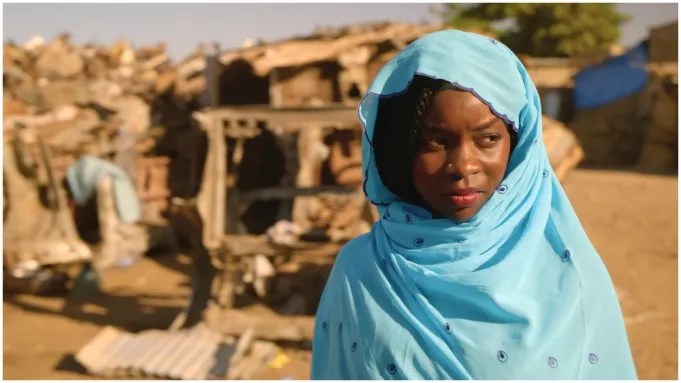
Photo courtesy of Miami Film Festival

Audio By Carbonatix
This year’s edition of Miami Film Festival Gems offers a shining selection from all over the world with all kinds of potential. Some of our most anticipated films of the rest of the year and the upcoming awards season are featured in the lineup, including Belfast, Great Freedom, and The Worst Person in the World. The festival even had a special early screening of Pablo Larraín’s fascinating Princess Diana film Spencer in anticipation of the fest. (The feature will open alongside the festival at Tower Theater on November 5.)
With a packed lineup of films, New Times has a handful of recommendations to check out at this year’s Gems.
Flee
Jonas Poher Rasmussen’s Flee has been much talked about since its premiere at Sundance this year, and it’s no surprise why. As something of a “serious picture” with grounded animation that tells a true story instead of anything particularly fantastical, it has everything to attract people wary of watching animated films.
The animation is palatable enough, sufficient accompaniment for the film’s true star: the recollections at its core. Flee’s subject, Amin, is a fascinating figure whose story of survival and being a refugee is often engrossing. There’s a beautiful simplicity in witnessing a queer man recalling his life. Still, the film continually uses awkward aesthetic shifts and telegraphed melodramatic beats (and some haphazardly spliced-in archival footage) that distract from the beauty within.
It’s by no means a bad movie, and those who are fascinated by something like Ari Folman’s Waltz With Bashir will no doubt be easily won over, but there’s something about the feature that feels more suited to other mediums. One can easily imagine it as a graphic novel rather than an animated film or an extended podcast if one feels the power is in Amin’s storytelling. The film’s strengths are in the little moments and how it lovingly and quietly captures queerness; it’s in the expressions on his face, the small gestures he makes, and the intimate memories he shares. 7 p.m. Wednesday, November 10, at Tower Theater.

Lingui: The Sacred Bonds
Photo courtesy of Miami Film Festival
Lingui: The Sacred Bonds
Early in Lingui: The Sacred Bonds, Amina (Achouackh Akbar), a thirtysomething single mother, is told during an awkward and ill-fated marriage proposal that she “needs a man to protect her.” As the film unfolds, it becomes clear that men do not offer protection but instead are something from which one needs protection. In his eighth feature film, director Mahamat-Saleh Haroun provides a delicate yet searing examination of how patriarchal power oppresses women.
Set in Chad, the country the director fled in 1982 to escape civil war, the film begins as Amina, a mother and devout Muslim, learns that her daughter, Maria (Rihane Khalil Alio), has been expelled from school for being pregnant. The news comes as a shock to both. Fifteen-year-old Maria promptly expresses her desire for an abortion. Amina violently attacks her, screaming about the “shame” she has caused. Amina’s visceral reaction is rooted in her own complicated past as an unwed mother who was disowned by her family. Haroun expertly depicts the cyclical violence that can result when reproductive freedom is restricted. Eventually, Amina relents and works to procure an abortion for her young daughter.
As the first feature-film director from Chad, Haroun has made a career of using a humanist lens to explore manhood in relation to his homeland. Lingui represents a refreshing pivot that puts female protagonists front and center in an exploration of the sacred bonds between women and the enduring profanity of patriarchal power structures. The obstacles that prevent Maria from obtaining an abortion are cultural, political, and economic. In Chad, abortion is outlawed. In the Muslim faith, abortion is immoral. To add insult to injury, Amina and Maria are unable to afford the procedure. Such barriers force both women to desperate acts of self-exploitation and self-destruction until they discover an unspoken sisterhood.
With the help of two excellent central performances, Haroun crafts a moving and timely tale about the resilience of women in the face of oppression. Despite its heavy subject matter – similar to film such as this year’s Venice Film Festival winner Happening (also playing at Gems), about a young woman attempting to obtain an abortion in the 1960s, or last year’s Never Rarely Sometimes Always, about another young woman in the same circumstances in the United States in 2020 – Lingui achieves catharsis during a time of great anxiety in regard to reproductive rights. Screening virtually on Friday, November 5.

Parallel Mothers
Photo courtesy of Miami Film Festival
Parallel Mothers
Parallel Mothers starts like a joke: Two strangers walk into a maternity ward. The film finishes as a meaningful meditation on confronting trauma, whether personal or political. One of the pleasures of Pedro Almodóvar’s cinema is how happenstance and fate are so intrinsically linked. This is the case with his latest film, which opens this year’s Gems.
The two strangers are Janis (played by a career-best Penélope Cruz), a confident fortysomething photographer, and Ana (played by newcomer Milena Smit), an anxious and aimless teenager. Both women are alone for different reasons, and both are about to become single mothers. They form a strong bond that will carry them through the roller coaster of emotions requisite for an Almodóvar film. Plot twists (not to be mentioned here) abound with a litany of one-in-a-million occurrences that in the hands of anyone else would illicit eyerolls, but in Almodóvar’s assured grasp further cement him as the modern master of melodrama.
In her seventh collaboration with Almodóvar, Cruz is the film’s anchor. Much like her Oscar-nominated role in Volver, Cruz taps into an authenticity that anchors the heightened emotions at play in Almodóvar’s world. At the same time, Cruz’s Janis, which won her a Best Actress nod at the Venice Film Festival, is unlike anything she has played before. She is mesmerizing to watch; each gesture is as surprising as it is relatable. It is a performance so intoxicating and lived-in that it will be no shock when she receives her third Academy Award nomination this year.
Parallel Mothers is Almodóvar’s most political film to date. Sexual and historical politics have always been a part of his cinema, but here Almodóvar includes a subplot directly addressing the atrocities of the Spanish Civil War. Though the two tracks do not fit together perfectly, both storylines are equally compelling and expertly conveyed. In the film, a character laments, “You’ve made things too complicated” always a risk in Almodóvar’s cinema. In the end, the film coalesces into a powerful look at the catharsis found in confronting and excavating the past to move toward a better future. This might not rank as Almodóvar’s best film, but there’s a good chance it will be the best film you see this year. 7 p.m. Thursday, November 4, at Tower Theater.